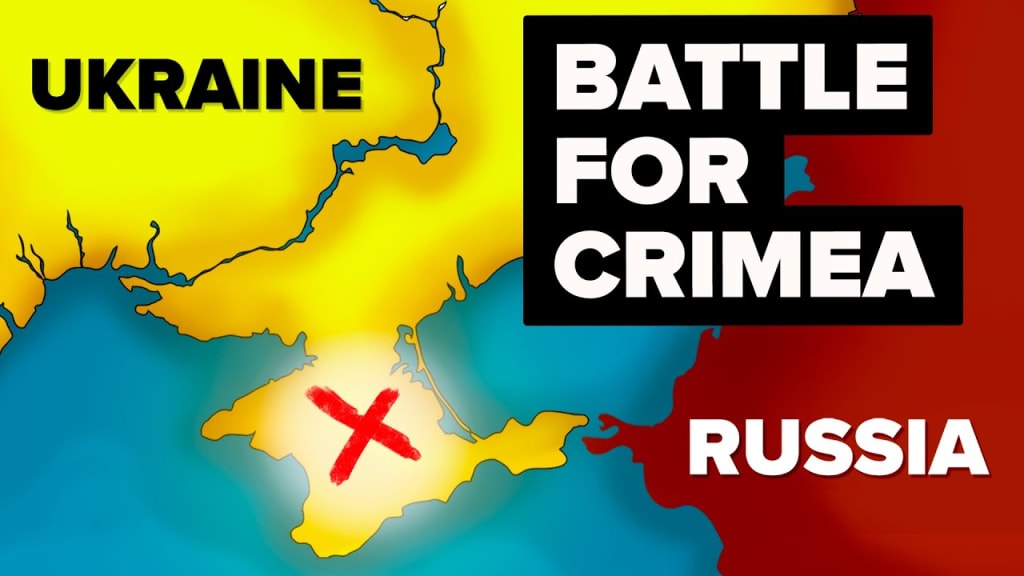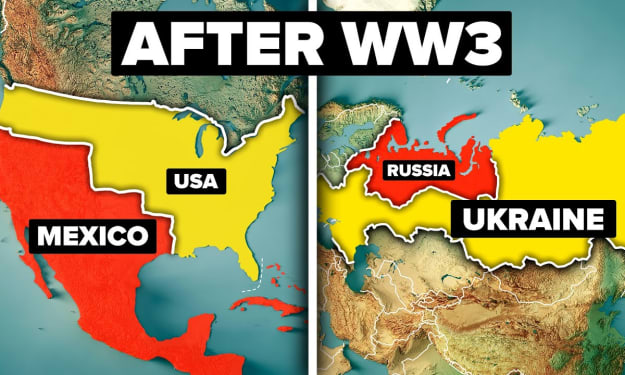Why is spring a key factor in determining the outcome of the war for Ukraine?
Winter has descended on the Russia-Ukraine conflict, effectively immobilizing both troops. Nobody wants to battle in the middle of a harsh European winter, including the Russians! Hence, for the time being, both armies are battling over minor Eastern villages and cities. Yet spring is on its way, and with it, the possibility of a new battle. Might this spring decide who wins the Russia-Ukraine conflict? ❕❕😠🆚😡❗❗

Winter has descended on the Russia-Ukraine conflict, effectively immobilizing both troops. Nobody wants to battle in the middle of a harsh European winter, including the Russians! Hence, for the time being, both armies are battling over minor Eastern villages and cities. Yet spring is on its way, and with it, the possibility of a new battle. Might this spring decide who wins the Russia-Ukraine conflict? ❕❕😠🆚😡❗❗
The Russia-Ukraine war has entered winter, and as a result, both armies have largely been immobilized. Both armies are currently limited to fighting over minor Eastern cities and settlements because nobody wants to engage in combat during a harsh European winter, including the Russians. But as spring approaches, there may be a chance for another conflict. Could the outcome of the Russia-Ukraine War be decided this spring? It certainly could be in Russia's favor given that Putin appears determined to continue the conflict no matter how many lives are lost or how much of Russia's military infrastructure is sacrificed. He reportedly plans to launch a second, more significant offensive as soon as the weather warms up after his initial mobilization failed and raised tensions in Russia.
Most reports on this come from Ukrainian intelligence because, unsurprisingly, Russia doesn't share its military plans with them. Vadym Skibitsky, a representative of the Main Intelligence Directorate, claimed that Russian troops are amassing in the Donetsk and Luhansk Oblasts. A major attack on the east could help Russia retake much of the territory it lost to Ukraine in recent months, but that would put it far from Putin's original objectives and return it to where it was before the war began. Approximately 25 percent of Ukraine's territory would be taken, which would be a terrible blow to Ukraine but also a humiliation for Putin. His subsequent remarks about the war made it clear that this was more about reclaiming the land lost when the Soviet Union collapsed, in contrast to his earlier comments about the war, which boasted about de-Nazifying the nation.
Despite his strong desire, Putin's options are constrained. A large-scale mobilization would necessitate a heavy draft and could increase Putin's vulnerability to an internal uprising. Increasing the bombing of Ukraine would probably force NATO to provide even more anti-missile technology, and Putin doesn't appear to be willing to directly challenge NATO. The only alternative left is to attempt to reopen a different front. While Russian troops advance into Ukraine from the east, Putin might persuade Alexander Lukashenko, the president of Belarus, to either send Belarusian troops into Ukraine or to open the border, allowing Russian troops to invade and advance on nearby Kyiv. But it might be simpler to say than to do.
Although his country's military isn't very large and protests against his rule have shook the nation in recent years, Lukashenko is one of Europe's last dictators and heavily depends on Putin to maintain his regime. He has therefore made all the right statements about Putin's war, but he has refrained from taking a direct role, particularly once it appeared that Russia was losing. The main issue facing Russia is the paucity of outside assistance. Even China has distanced itself from Putin in recent months, leaving Russia to heavily rely on Iran for the shipment of weapons. The fact that Putin has so few options for winning the war makes it unlikely that he will be able to do so in the spring. Even so, it is almost a given that he will intensify his attack and hurt many people.
However, the question is: Can Ukraine win? Before the war, nobody believed this was possible. Even from media outlets aligned with Ukraine, there was a sense of fatalism where most people thought the country would be overrun in weeks and that Zelensky and other leaders should consider fleeing and fighting the Russian occupation in exile. After all, the contest pitted a nuclear-capable great power against a recently independent nation with an unrest-ridden political system. Then the Ukrainian defenders engaged in ferocious combat, international aid began to arrive, and the tide of the battle dramatically turned. And Zelensky hasn't been afraid to implore the world to take more action. Ukraine has recently received numerous significant shipments of weapons.
Among them are the long-desired Patriot missile air defense batteries. German Leopard tanks and the cutting-edge American Abrams tanks were ultimately promised after a difficult series of tank negotiations. As a result, Ukraine continues to have access to modern weapons, while Russia is left with an arsenal from the Cold War that Ukraine keeps depleting through successful attacks. Though intelligence may be Ukraine's most potent weapon, Ukraine can anticipate the impending offensive, but they can't really stop it because of Russia's constrained options for victory. Large portions of eastern Ukraine are still under Russian control, and they can concentrate their troops there in preparation for a future offensive.
However, this means that Ukraine is largely aware of the likely origin of the attacks and can prepare for them by simulating possible outcomes. Therefore, the world's highest-stakes game of chess is generally played during the winter. Both sides are attempting to outsmart one another, but Ukraine has far more options than Russia for getting the upper hand. This may be Russia's last opportunity to make a significant move given the current circumstances. Putin may be willing to fight until the very end, but sooner or later, the very last man will lose. The previous mobilization effort was fraught with difficulties because a sizable portion of the draftees came from ethnic minorities with complicated ties to Russian rule, many of whom might not have been as eager to act as cannon fodder.
The drafted Russians were frequently professionals who were thrust into battle without much training, which resulted in a high death toll. Putin will experience a severe backlash from both his own people and even his military if this pattern repeats itself in the spring, in addition to a troop shortage. How can Ukraine make the invasion disastrous for Putin? Ukraine is reluctant to attack until they are prepared for a protracted conflict, so the relative calm until spring is to their advantage. There will soon be a significant increase in the amount of weapons supplied by the US and its allies, but that isn't their only option for improving their chances. The few entrances into the region under Kyiv's control are being heavily fortified by the Ukrainians, who have set up checkpoints, guard towers, and troop outposts.
While an invasion from Belarus may be less likely, Ukraine is taking no chances. And it's not just in the east. The route from Belarus to Kiev passes through a swampy forest area that is heavily dotted with landmines. Russia will likely encounter a heavily fortified Ukrainian line wherever it makes its next move. The challenge will be greater in other theaters of the war. Putin has been unable to seize the territory he desired, but he has demonstrated that he is willing to do whatever it takes to break Ukraine's spirit. Heavy bombing of civilian areas has been a defining feature of the conflict; in the early stages, maternity hospitals as well as apartment buildings and schools were targeted. That has been the only aspect of the war that has remained unchanged over the winter.
The negotiations may therefore be the most crucial aspect of what occurs in the spring. There is no common ground to negotiate over between Ukraine and Russia, so negotiations between Ukraine and its allies are necessary instead. Ukraine has made significant requests for equipment to help it defend itself, but NATO has had some redlines it won't cross so far, most notably that they are not willing to provide offensive weapons that Ukraine could use to effectively strike over the border into Russia. Although Ukraine has targeted a number of military facilities and troop barracks on Russian soil, it is unable to do so with major Russian cities. But could this be changing? Some weapons, like fighter jets and long-range missiles, are likely to remain off-limits, although initially, analysts would have said the same about Patriot missiles and tanks.
Although most analysts think Putin's nuclear threats can no longer be taken seriously, NATO is still reluctant to take any action that Putin might claim is a direct NATO attack on Russia. NATO may be willing to assist Ukraine in escalating the conflict in some other significant ways, despite the fact that it is unlikely that they will actively encourage Ukraine to attack Russia directly. But the current targets in the east might just be a distraction. The majority of the fighting currently takes place in resource-critical, bombed-out settlements like Soledar and Bakhmut.
The most important battleground, however, might be in Ukraine's south, in the region bordering the Black Sea. This important water route was heavily contested when Russia attempted to seize control of it early in the conflict in order to stymie global trade. Because Russia is losing ships quickly and may not be able to contest the area for very long, if Ukraine is able to take out more of Putin's Black Sea fleet, it could change the course of the war.






Comments
There are no comments for this story
Be the first to respond and start the conversation.